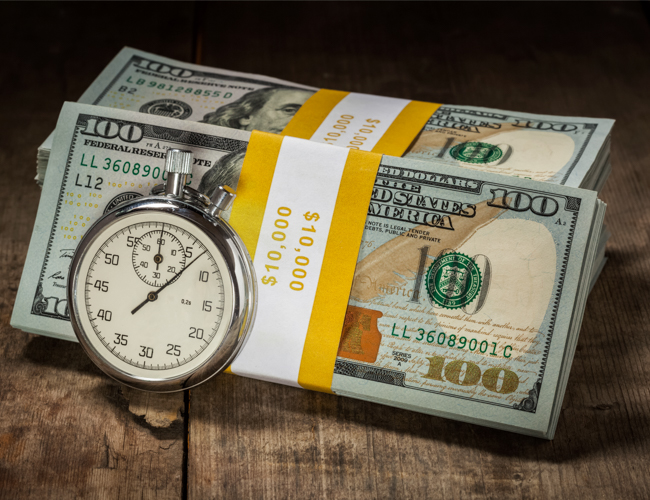19 Things You Should Give Up Now for a Comfortable Retirement Sponsored By:Flavio J. “Joe” Carreno

What are you ready to sacrifice right now to save for retirement? Principal posed this question to its retirement plan members who are “super savers,” defined as those who saved 90% to 100% of the 402(g) IRS maximum contributions or had a deferral percentage of 15% or above in 2018.
Keep reading to learn what these savers have given up for the sake of a secure financial future, and find out what experts believe makes a difference in reaching your long-term savings objectives, such as early retirement.
Cars, houses, and travel are the three areas where supersavers make the most sacrifices.
According to the Principal poll, 43% of super savers drive older automobiles, 41% own modest houses, and 41% travel less than they would like. Another frequent sacrifice made by savers is a DIY attitude to renovations and repairs, with 40% preferring to handle things themselves rather than paying outside help.
Supersavers also overspend
Just because you’re dedicated to saving for retirement doesn’t mean you have to forego small indulgences. Forty-six percent of super savers are subscribed to Netflix, Hulu, and other subscription entertainment services; 46% still splurge on vacations, and 39% go out to eat more than once or twice a week. When it comes to a daily Starbucks or Dunkin’ Donuts run, only 20% of super savers indicated they splurged on coffee on the fly.
What should you give up to save for a comfortable retirement?
To figure out what you should actually give up – and what you may splurge on – GOBankingRates asked financial experts to find out what sacrifices individuals should be prepared to make to save for the future. Here are some of the expenses they recommend you cut out immediately.
Your daily cup of coffee
Although financial experts are divided on whether giving up your daily coffee to save for future expenditures is a good idea, others feel that every little bit helps.
“You should be prepared to forego drinking coffee at a coffee shop rather than at home,” said Ed Snyder, president and co-founder of Oaktree Financial Advisors, Inc., who considers this cost an “extra.” You simply need what you need. People nowadays have a tough time distinguishing between needs and wants.
Snyder elaborated why he feels that giving up minor things like coffee shop lattes, dining out frequently, and buying items you don’t need is worthwhile in the long term.
“A dollar saved now will increase to $7.60 in 30 years at a 7% return rate,” he says. Every dollar you spend today will cost you about $8 in retirement. In other words, if you spend $100 each week on these extras, you’ll spend $5,200 every year. At retirement, the amount would grow to more than $38,000.
Massages and other extravagances
It’s okay to indulge yourself once in a while, but you shouldn’t regularly spend on needless luxuries.
“Some of my clients have two to three massages each month,” says Delano Saporu, founder and financial advisor of New Street Advisors Group. For someone who is still in the process of building wealth, forgoing certain pricey indulgences and complementing with other things such as a low-cost gym membership with a spa may be a better option.
New cars
Forty-three percent of super savers stated they drove older automobiles to save for retirement; this is the most common sacrifice made by great savers to save. Craig Kirsner, author, speaker, and president of Stuart Estate Planning Wealth Advisors, believes that making this sacrifice is a wise decision.
Depreciation might cause you to lose more than 20% of the car’s worth after the first year of ownership. “If you purchase a two-year-old car with an extended warranty, you save 30% to 40%; over a lifetime, that may add up to having much greater retirement assets at age 65,” Kirsner explained.
Upgrading your vehicle regularly
“Not only should you buy used vehicles, but you should also keep them longer,” according to Mark Wilson, founder and president of MILE Wealth Management.
“Extending car ownership from five to seven years would free up a significant amount of income for retirement savings,” he added. Assume your average monthly car payment is $400. If you can spend two years without the car payment and save the money for those two years, you’ll have $9,600 to put towards your nest egg.
Getting a second car
Holly Andrews, managing director of KIS Finance, suggests selling one to slash auto expenses in half if your family owns two cars.
“When you include gas, insurance, tax, and maintenance, the expense of driving a car is extremely high,” she added. “Determine how much the second car would have cost you over the course of a year and set aside that amount for retirement.”
Andrews admits that this sacrifice may require some adjustment, but the long-term return may be worth it.
You will need to sit down and figure out who has to use the car when and for which purposes, and you might need to consider public transport or carpools, but if this is a sacrifice you are willing to make, it will save you a lot of money.
A bigger house than you actually need
According to the Principal poll, owning a modest home was the most common sacrifice of super savers to save for retirement, followed by driving an older car.
“Buying a cheaper property is the simplest way to reduce costs and save more for retirement,” said David Ruedi, financial advisor, and Ruedi Wealth Management’s vice president. If you buy the largest house you can afford, the mortgage will consume the majority of your earnings. Frugal house purchases are one-time decisions that can considerably enhance your cash flow for the rest of your life, freeing up funds for retirement savings and other discretionary expenses.
Ruedi also says that the joy of owning a big home wears off fast.
Research indicates that individuals take their materialistic purchases for granted after a while, so cutting down doesn’t mean you’re giving up on current happiness, he added. If anything, a low-cost house purchase will boost your present happiness since you’ll have the peace of mind that comes with knowing you’re in a good financial position.
Cashing in a bonus
When you receive an unexpected bonus, your first impulse is probably to spend it on some luxury that you wouldn’t usually be able to pay for. However, Jamie Hopkins, Carson Group’s retirement research director, believes that changing this mindset is critical in order to save for retirement. He says that automating your contributions is the key to retirement planning.
“This includes strategies such as transferring bonus funds directly to retirement and establishing automatic 401(k) contributions on your job,” Hopkins explained. The more automated our savings are, the better off we’ll be since we won’t experience the pain of missing out on today’s short-term consumption. It will be much harder if every time I consider saving for retirement, I have to make a conscious decision to give up a present necessity.
International travel
According to Nickolas R. Strain, senior wealth adviser and wealth advisory committee chair of Halbert Hargrove, you don’t have to go cold turkey and renounce all splurges. Still, you should cut down on these costs whenever possible.
Look for little ways to save a bit of extra money, he suggested. Take a vacation, but don’t go abroad; instead, stay in the United States to save money on flights.
If you save $200 on travel per month, you’ll save $2,400 a year, which adds up to $60,000 over 25 years (before interest).
“Most individuals can make these types of sacrifices,” Strain added.
The second-most frequent sacrifice made by super savers was “not traveling as much as I want,” which was tied with having a modest house.
Allowing FOMO to take over
According to Leslie H. Tayne, founder and lead attorney at debt solutions law company Tayne Law Group, buying or doing anything out of “fear of missing out” might derail your retirement savings goals.
“Whether you’re over your entertainment budget, you notice yourself succumbing to the latest fashion craze, or you’re feeling the urge to go out and spend all weekend, learn when to shut yourself off and simply say no,” she added. Sometimes you just can’t do everything and saying no could be the best thing you can do.
Fifteen percent of super savers said they told their friends or family “no” to regular expenses to save for retirement.
Subscription services
Although almost half of the super savers polled by Principal stated they splurged on entertainment subscriptions, Thanasi Panagiotakopoulos, founder and principal at LifeManaged, advises being selective about the number of subscriptions you’re signed up for and cancel any that you can live without.
“In this day and age, it’s really simple to sign up for multiple subscriptions since they’re ‘only’ $14.99 a month – Netflix, Amazon, Spotify, fitness memberships, food delivery services, applications on Apple devices, iCloud storage, and so on,” he added.
Panagiotakopoulos says you should carefully consider every subscription and whether or not you actually use it.
“As an example, ask yourself how frequently you go to the gym. Is it something you do regularly, or do you only walk with your partner and go hiking?” he said. That is an excellent example of a subscription that may be dropped while still enjoying today.
Getting lunch at a restaurant every day
“An excellent way to save money is to avoid spending money whenever possible,” according to Ryan Guina, founder of The Military Wallet and Cash Money Life.
“Bringing your lunch to work rather than dining out is one of the simplest ways to avoid spending,” he explained. Finding such opportunities to save money and invest it in your future will make you a champion in the retirement game.
Monthly get-togethers at the bar
Having a social life is essential, but going out and drinking can be a costly habit.
“If you grab a drink with friends once per month, it can be as much as $100 a night, totaling $1,200 in a year,” says Crediful’s CEO, Chane Steiner. You may considerably increase your retirement savings by quitting this habit and placing that money in a savings account. It doesn’t have to mean that you never do these things, but they should be splurges rather than frequent occurrences.
Outsourcing all tasks
According to the Principal poll, 40% of super savers prefer to perform DIY tasks themselves rather than hire outside help, and 37% don’t use a cleaning service. Andrews believes that this is a wise decision to increase retirement savings.
“A housecleaner or having your car valeted are luxuries in life that you should give up if you truly want to make a difference in your retirement funds,” she explained. Don’t hire someone else to do anything you can do yourself. Consider bartering and doing things for free with friends or relatives who have particular skills.
Purchasing premium brands while grocery shopping
“Choosing store brands might save you a lot of money in the long run,” says Andrews.
“It’s extremely easy to become trapped in the habit of buying the same goods and brands over and over again when it comes to grocery shopping,” she added. However, if you’re willing to do a little testing and research, you could probably reduce your shopping expenses by half by forgoing luxury products in favor of ones that are half the price but with the same quality.
Uber everywhere
Although taking a taxi or Uber is faster than riding the bus or train, it is also much more expensive.
“Little things such as taking a cab when public transportation is just as convenient or eating out five or more days a week may add up over the course of a year,” Investopedia editor-in-chief Caleb Silver said. While it’s nice to treat yourself once in a while, cutting those two splurges in half could save you $1,000 or more per year, which is only $83.33 a month. However, $1,000 invested in the stock market over ten years, assuming a 5% average annual return, will be $1,629 in ten years. That’s thanks to compound interest, and it’ll only cost you $83.33 per month.
Spending too much on rent
If you aren’t quite ready to purchase a house but have the money to rent a place, living alone is an enticing alternative. However, Logan Allec, CPA and owner of the personal finance website Money Done Right, believes that extra rent money should be put into a retirement account.
“Many of us want to live in a nice place or to get rid of roommates as soon as possible. While it improves your quality of life, it devastates your bank account,” he stated. Roommates might be annoying sometimes, but they could save you thousands of dollars a year.
Designer clothes
Designer clothing and shoes are unnecessary extravagances. The money you save by purchasing less expensive brands may be easily redirected towards retirement savings.
“Designer clothes may cost hundreds, if not thousands, of dollars for a single piece,” says Robert Gauvreau, CPA and founding partner of Gauvreau & Associates CPA. There are excellent designer-like alternatives available that may substitute for these purchases and save you a substantial amount of money.
Credit card purchases you cannot afford
Make sure the purchase is within your budget before swiping your credit card (or entering your credit card number online). Spending more than you can afford will put you in debt, and with credit card interest rates as high as they are, it will be difficult to get out of it.
“So many individuals put unnecessary purchases on their credit cards that they can’t afford right now, leading them to incur interest on an amount they can’t pay off,” Gauvreau explained. With annual interest rates in excess of 20%, you might soon find yourself in an expensive scenario where you are in debt and unable to find a way out.
Spa treatments
Jill Bradley, a Wells Fargo Advisors financial advisor in Louisville, Kentucky, says cutting back on pricey salon treatments like manicures, pedicures, and hair dyeing may make a significant impact on retirement savings.
“Consider going to the nail salon less often – women can spend thousands on this a year without realizing it,” she says. Regarding hair color, Bradley suggested prolonging the time between trips to the hair salon, buying a pack of root touch-up color, and in 15 minutes, you can delay a salon visit for a week or two.
Why is it so important to make sacrifices now to save for retirement?
“The ‘time value of money’ is a powerful incentive to save now and spend later,” Gauvreau explained. The time value of money is the concept that money available now is worth more than the same amount in the future owing to its earning potential. That implies that if you start saving and investing money today, you will acquire more wealth and retirement savings as a result of generating investment income and continuing to invest and earn money from these assets. So, saving now and spending later will help us accumulate more retirement funds, ensuring that we are ready for retirement when the time comes.
And once the day comes, your future financial health will be entirely dependent on your previous actions.
“Think about this the next time you want to splurge on something: You can borrow money for your children’s education, but you can’t borrow money for retirement,” Bradley added. “You have to save that money throughout the years on your own. That is why you should start saving for retirement rather than spending on frivolous purchases.”
Contact Information:
Email: [email protected]
Phone: 8139269909
Bio:
For over 30-years Flavio “Joe” Carreno of The Retirement Advantage has been a Federal Employee Retirement System specialist (FERS) as well as a Florida Retirement System specialist (FRS) independent advocate. An affiliate of PSRE (Public Sector Retirement Educators), a Federal Contractor & Registered Vendor to the Federal Government, also an affiliate of TSP Withdrawal Consultants. We will help you understand your FERS & FRS Benefits, TSP & Florida D.R.O.P. withdrawal options in detail while recognizing & maximizing all concurrent alternatives available.Our primary goal is to guide you into retirement with no regrets; safe, predictable, stable, for life. We look forward to visiting with you.
Disclosure:
Not affiliated with the U.S. Federal Government, the State of Florida, or any government agency. The firm is not engaged in the practice of law or accounting. Always consult an attorney or tax professional regarding your specific legal or tax situation. Although we make great efforts to ensure the accuracy of the information contained herein we cannot guarantee all information is correct. Any comments regarding guarantees, safe and secure investments & guaranteed income streams or similar refer only to fixed insurance and annuity products. Fixed insurance and annuity product guarantees are subject to the claimsâ€paying ability of the issuing company. Annuities are long-term products of the insurance industry designed for retirement income. They contain some limitations, including possible withdrawal charges and a market value adjustment that could affect contract values. Annuities are not FDIC insured.








